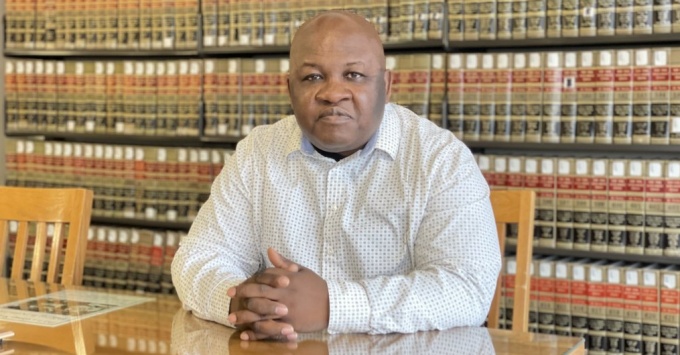
Fulbright Research Scholar Richard Alemdjrodo
Fulbright Research Scholar banks on Buffalo
It’s a financial vehicle that works: syndication, in which banks band together to construct large-scale loans that can finance huge projects in areas like infrastructure, health care or education.
Such global financial players as the World Bank and the International Monetary Fund have long used syndication to share the risk of lending and catalyze initiatives in developing countries. But the practice is rarely used in Africa, and a scholar from the West African nation of Togo is spending a year at UB School of Law as a Fulbright Research Scholar, studying the practice and exploring ways it could be used in his country.
Richard Alemdjrodo, who teaches business law at the University of Lomé in Togo’s capital, reached out to UB Law Professor Mateo Taussig-Rubbo, to pursue the opportunity to do research in New York State.
“We’re lucky to have Richard join us at the law school,” Taussig-Rubbo says. “He brings a wealth of experience, and is exploring important questions about how to leverage locally held wealth. His focus is on banking in West Africa, but it is also interesting to think about his topic in the Western New York context.”
When it works, Alemdjrodo says, bank syndication can be a game-changer. He cites as an example the Lake Turkana Wind Power Project in northern Kenya. With 365 turbines, it’s Africa’s largest wind power plant—and at a $775 million price tag, only syndication could have financed it. “You had a lot of banks coming together to make this project happen,” he says. “It’s an example of how these financing mechanisms can work, in this case to provide clean local power by increasing the national power generating capacity.”
In Buffalo, Alemdjrodo’s research has included interviewing major players in the banking field, including those in Buffalo, Toronto and New York City. “It’s very important for me personally to understand the scope of my topic,” he says. “My goal is to understand the legal mechanism of bank syndication, but I’m also interested in why the World Bank and the IMF are so adamant to engage in this and promoting bank syndication in Africa.”
At the close of the academic year, he’ll return to Togo with hopes that his scholarship will bear fruit in the nation’s development. “The government and the banks are always looking at the universities and the professors for information about these topics,” he says. Complicating the process is that legislation on business law is not decided at the level of Togo alone, but that of the Organization for the Harmonization of Law in Africa (OHADA) which brings together 17 African States. “If you want to legislate in this area,” Alemdjrodo says, “this must be done by all the 17 African countries. I’m interested in how the law here in the U.S. works, how it is built. This will help me to make some suggestions to organizations that want to go in this direction.”
Alemdjrodo has studied abroad before. At the University of Saarland in Germany, he earned two master of laws degrees and a PhD, and at the École Nationale d’Administration Publique, in Quebec, a master’s degree in public administration.
His first language is French, Togo’s official language, and he’s also fluent in English and German. He has published articles in all three languages.
Alemdjrodo has nothing but kind words for his Buffalo experience. “I would recommend UB for my colleagues in African universities who want to spend their Fulbright year in the U.S., especially the law school,” he says. “The people are welcoming, very, very nice, and they’re available to help you. I have nothing but good things to say about UB.”